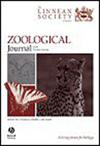A new approach allows morphological recognition of cryptic diversity of the krill genus Hansarsia (formerly Nematoscelis)
IF 3
2区 生物学
Q1 ZOOLOGY
引用次数: 0
Abstract
Cryptic and pseudocryptic species are found on all major branches of the tree of life and probably represent a significant portion of undiscovered biodiversity, yet their identification is currently possible solely on the basis of molecular analyses. Here, we tested an alternative approach and hypothesized that all genetic clades might be identified on a morphological basis, and we analysed the morphology of nine previously detected genetic clades of Hansarsia. We made 169 sets of measurements (12 quantitative characters for each), ran multinomial logistic regression models, and showed a high ability of these models to generalize (i.e. to be able to classify correctly new specimens not included in our data matrix). The five to seven most ‘powerful’ characters provided a significant detection rate; these characters were shown to represent distinct evolutionary traits. Our findings cast some doubt on the presence of the ‘merely’ cryptic species; instead, we suggest that any genetic divergence found via traditional genetic markers is also mirrored in morphological divergence and can be detected using a combination of quantitative characters and appropriate mathematical tools. We provide a script key to genetic clades of the Atlantic Hansarsia based solely on morphological measurements and encourage other researchers to use quantitative morphological characters for detection of cryptic clades in other taxa.用新方法识别磷虾属 Hansarsia(原 Nematoscelis)的隐蔽多样性
在生命树的所有主要分支上都发现了隐性和假隐性物种,它们可能代表了很大一部分未被发现的生物多样性,但目前只能通过分子分析来鉴定它们。在这里,我们测试了另一种方法,并假设所有的基因支系都可以根据形态学来识别,我们分析了之前发现的九个汉萨亚基因支系的形态学。我们进行了 169 组测量(每组 12 个定量特征),并运行了多项式逻辑回归模型,结果表明这些模型具有很强的概括能力(即能够对数据矩阵中未包含的新标本进行正确分类)。五到七个最 "强大 "的特征提供了显著的检出率;这些特征被证明代表了不同的进化特征。我们的研究结果让人对 "仅仅 "存在隐居物种产生了一些怀疑;相反,我们认为通过传统遗传标记发现的任何遗传分化也反映在形态分化中,并且可以通过定量特征和适当数学工具的结合来检测。我们提供了一个完全基于形态测量的大西洋汉沙属遗传支系的脚本钥匙,并鼓励其他研究人员使用定量形态特征来检测其他类群中的隐性支系。
本文章由计算机程序翻译,如有差异,请以英文原文为准。
求助全文
约1分钟内获得全文
求助全文
来源期刊
CiteScore
6.50
自引率
10.70%
发文量
116
审稿时长
6-12 weeks
期刊介绍:
The Zoological Journal of the Linnean Society publishes papers on systematic and evolutionary zoology and comparative, functional and other studies where relevant to these areas. Studies of extinct as well as living animals are included. Reviews are also published; these may be invited by the Editorial Board, but uninvited reviews may also be considered. The Zoological Journal also has a wide circulation amongst zoologists and although narrowly specialized papers are not excluded, potential authors should bear that readership in mind.

 求助内容:
求助内容: 应助结果提醒方式:
应助结果提醒方式:


